Chris Fischer is a farmer, cook, and teacher who was weaned on an earthy, sustainable food sensibility that is gaining converts by the minute. His family has run a farm on Martha’s Vineyard since 1961, and in recent years Fischer has talked his way into the good graces—and kitchens—of culinary icons Mario Batali, Keith McNally, and Alice Waters. For the passionate, compulsively entrepreneurial 36-year-old, a part-time instructor in BU’s Metropolitan College Programs in Food & Wine, “farm to table” is neither a movement nor an urban conceit: it’s all he’s ever known.
Fischer describes his culinary education as “a lot of traveling and a lot of eating.” But, as the chef at the newly opened Edgartown restaurant Covington prepares a simple honey pie dessert, he says, “I’m not cut from the same cloth” as most celebrity chefs and high-profile foodies. For example, one of his signature dishes, which he loves to prepare for friends at his famous beach cookouts, is grilled bonito. The fillets are served with…absolutely nothing. No sprigs of thyme reaching skyward, no puréed this or confit de that. Not that Fischer can’t whip up a sea bream foam with the best of them. But his approach to cooking is without pretense, and with deference to the scents and flavors bestowed by the sea and the soil.
Named for a tug that collided with a freighter off the Vineyard’s Port Hunter in 1918, the Covington is in a low-slung clapboard building with an arbor embracing front and side café tables. Owned by Vineyard natives Patrick and Ted Courtney, who also own the neighboring restaurant Port Hunter, it divides its offerings among “raw and cured,” salad and vegetables, pasta, meat and fish, and desserts—most of them locally sourced. Some of those heirloom tomatoes on the menu were harvested by Fischer’s own hands at Beetlebung Farm, his family farm in nearby sleepy Chilmark. His grandfather Ozzie, the first to farm Beetlebung, died in 2011, at age 96. His grandmother, now 101, lives on the farm in a house that used to be her beauty salon.

Chris Fischer, an instructor in MET’s Programs in Food & Wine, at his family’s Martha’s Vineyard farm in Chilmark, Mass. Fischer is the chef at the newly opened Covington restaurant in nearby Edgartown, where he serves up his farm’s harvest.
With cowriter Catherine Young, Fischer pays tribute to the family in The Beetlebung Farm Cookbook (Little, Brown, 2015). Returning home from New York City after his mother’s death in 2005, he started hosting now-legendary farm dinners. “I found it surprisingly easy to leave the field and have a meal prepared by sundown, because the ingredients here are so fine they are best almost left alone,” Fischer, a 12th-generation islander, writes in his cookbook. “I realized then what I had always instinctively known, that the food we grow, the fish we catch, the animals we hunt, and those we raise on grasses and flowers salted by the sea breeze are special because of this place.”
“We are blessed to be on Martha’s Vineyard,” says Fischer, whose column for the weekly Vineyard Gazette might report on foraging for wild beach asparagus or visiting a retired post office worker in Nagano, Japan, whose doctor gave him a year to live and he decided to spend it farming. (He lived for many more years.)
From 2013 to 2015, Fischer was chef at Chilmark’s Beach Plum Inn and Restaurant, near the farm. He removed the wall between the kitchen and the dining room there “so we could see people eating the food and the diners could see us cooking.” But he cut his culinary teeth off-island, at the pasta station of Batali’s Babbo, an invaluable experience that stuck with him. Still, the greatest creative inspirations remain the folks who raised him. His mother, an artist and public school teacher, taught him “to paint outside the lines.” His father, a long-liner who “loved to pull things from the sea,” fed his small children swordfish the way landlubbers soothe their toddlers with mac and cheese. “I have a unique relationship to food,” Fischer says. “I know a lot about its origins, I spend time with fishermen, and I educate myself. I do a lot of on-the-ground research. I grew up with a dad and a grandfather who were extremely thrifty. Getting dinner was an activity. My dad more than anyone displayed to me the pure joy of growing and raising food.”
America’s food system is broken, he says: look at dairy and beef, two of the most negatively influential foods in history. Consider the amount of antibiotics and water used to raise them, “so everyone can have cheeseburgers.” Fischer serves island-grown pork and grass-fed beef and laments the common dismissal of less frequently consumed meats such as goat or rabbit for “gaminess.”
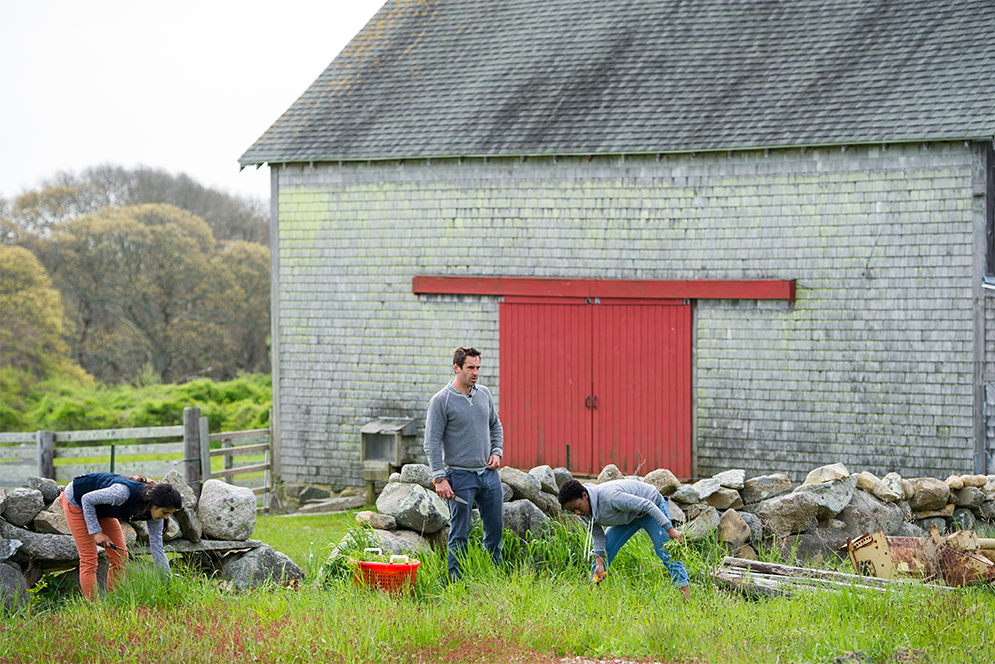
Sonia Dovedy (MET’17) (from left), farmer and chef Chris Fischer, and Valencia Baker (MET’17) at the Fischer family’s Beetlebung Farm, in Chilmark, Mass., on Martha's Vineyard.
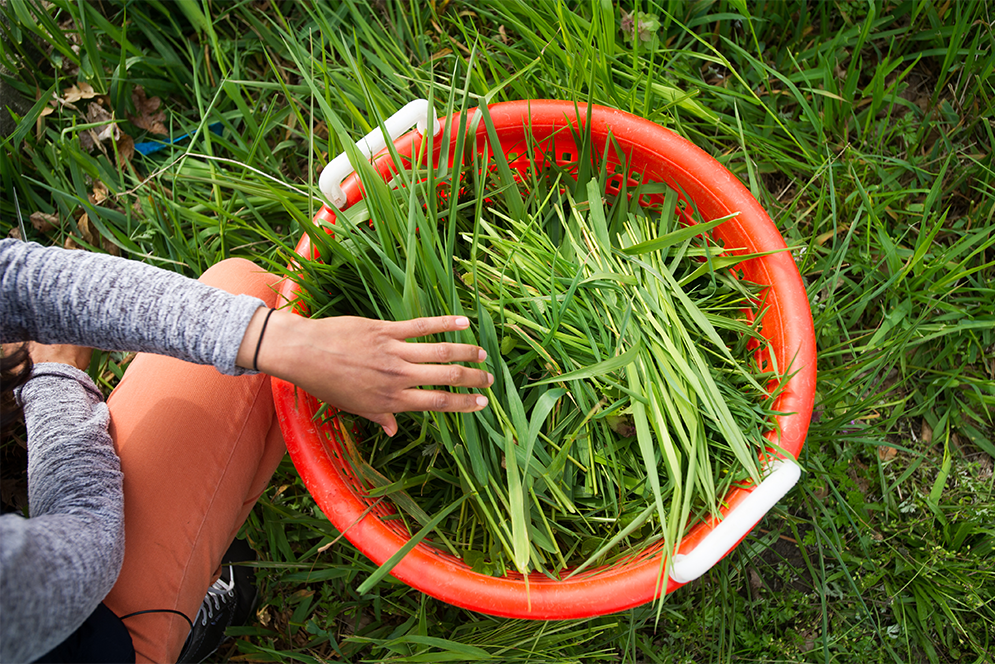
The farm’s rabbits are fed a diet of grass, helping to keep them happy and the lawn trimmed.
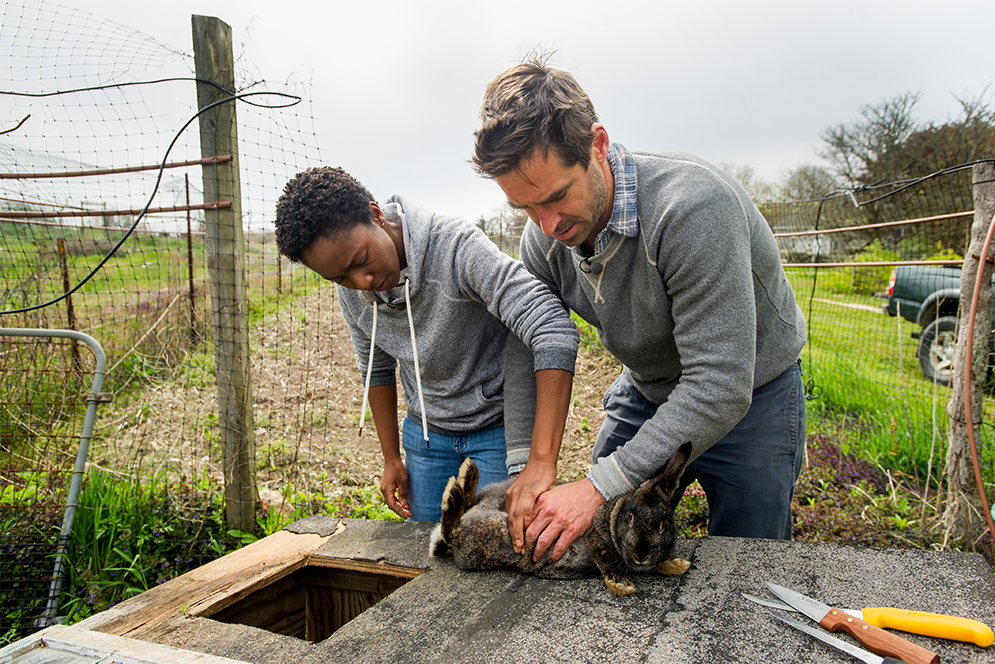
Baker and Fischer check whether a rabbit is pregnant by pushing on its belly and feeling for “marbles” (it was). The farm’s rabbits are raised for meat and pelts.
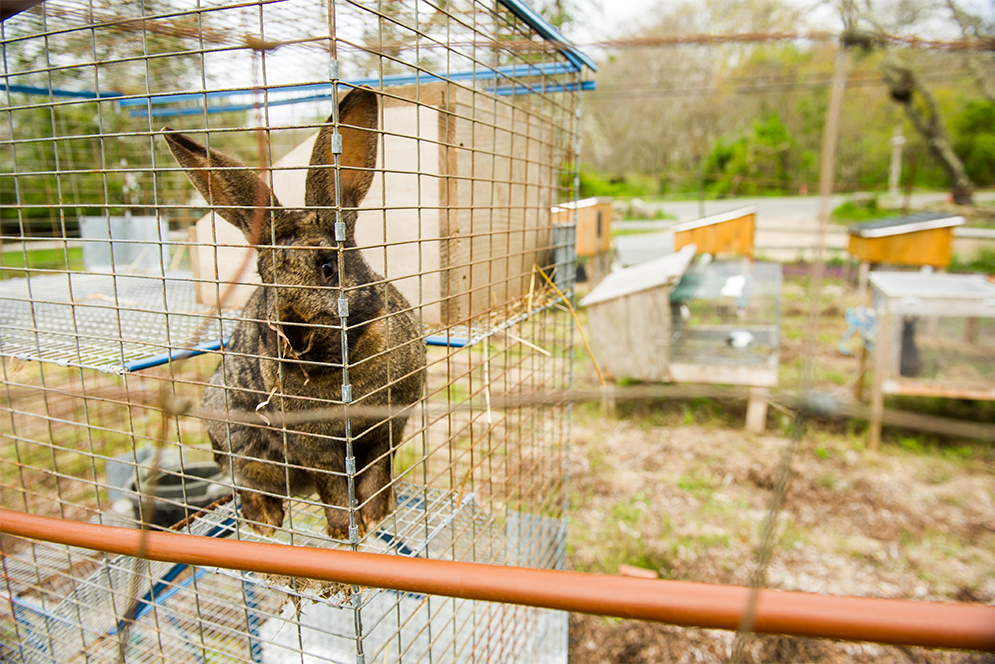
A denizen of Beetlebung Farm.
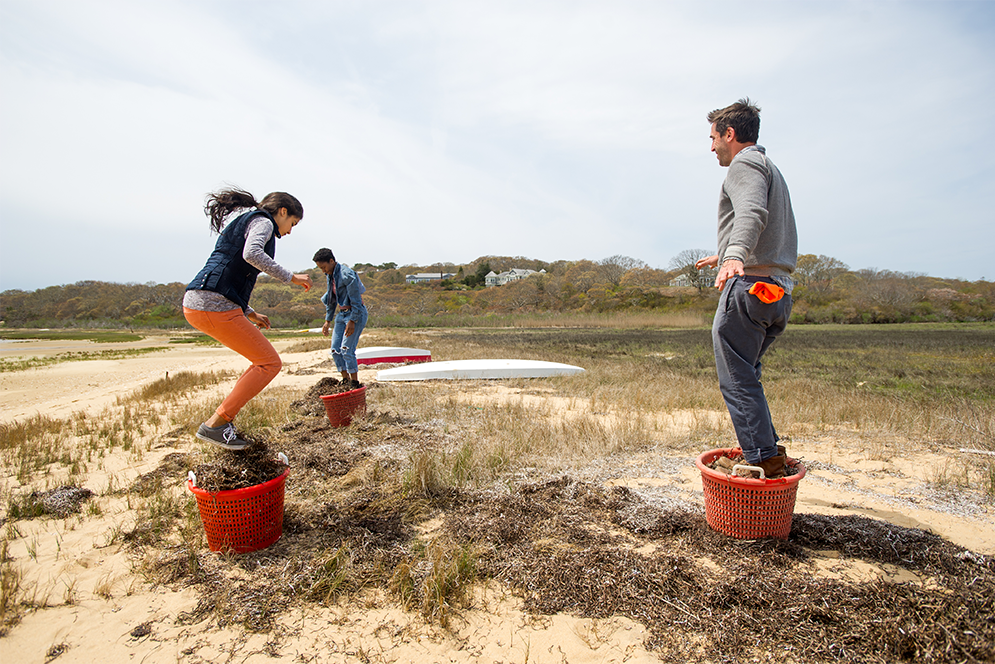
Dovedy (from left), Baker, and Fischer harvesting seaweed for the pigs’ pen. The animals play in it and it provides compost for the soil.
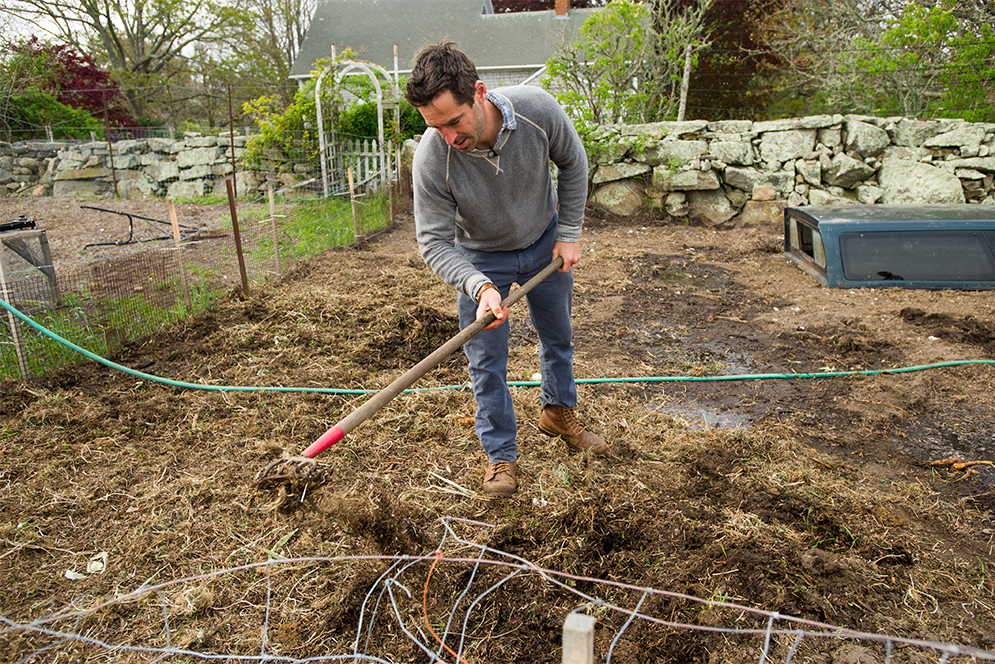
Tilling the seaweed, shells, bones, and manure in the pigs’ pen ensures that the soil remains healthy and the pigs happy.

Yum: chow time at Beetlebung Farm.
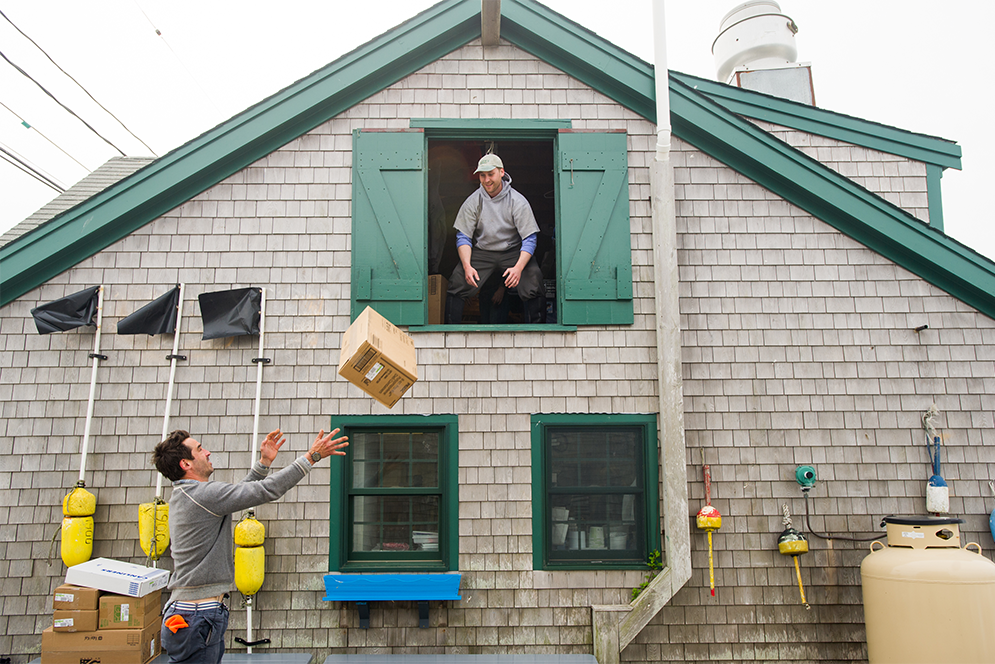
Fischer snagging some of Menemsha’s Larson’s Market squid, which will soon be on the Covington dinner menu.

Beetlebung Farm field-worker Jackie Gorman planting greens in the farm’s cold frame.
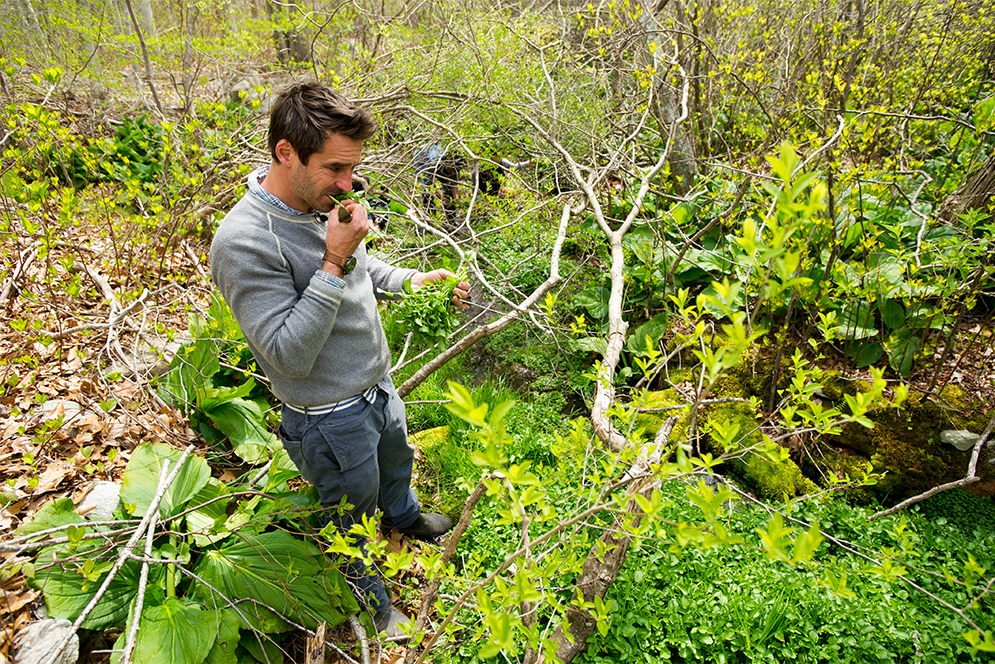
Fischer foraging for wild watercress at his secret location near the farm.

These greens couldn’t be fresher.

Time to cook: Baker (from left), Dovedy, and Fischer collaborate.
On most days, he arrives at the restaurant about 10 or 11 a.m. to supervise the cleaning of fish, trimming of vegetables, and sprucing up of the small dining room and bar. He extracts his knives from a box he totes to the restaurant and back with the reverence that Yo Yo Ma must give his cello. Cradling a short, thick blade, he says that it’s one he used to slaughter a goat in one swift motion. Fischer wants his customers and friends not just to love food, but to respect and honor its source. Submitting to prevailing tastes is sometimes the cost of doing business. Fischer once served a dish of chicken with its head still on—that didn’t go over so well.
“I have a nontraditional approach to work,” he says. “I jumped into the chef world, but without a chefly background and was so focused for the first two and a half years that I taught myself to run Babbo’s three-star kitchen when I was 25.” Fischer went on to cook at Ruth Rodgers’ River Café in London and at Alice Waters’ Sustainable Food Project in Rome. Wherever he traveled, he brought culinary knowledge home. The lessons from his travels in Japan surface across the Covington’s menu: a beet salad with the minty Asian herb shiso, a Menemsha sea bass fillet with soy-mirin glaze. Like Waters, who ignited an eat fresh–eat local revolution with her Berkeley restaurant Chez Panisse, Fischer creates recipes around ingredients that beckon to him with their authenticity. A California friend’s hand-harvested almonds become a Covington appetizer: toasted mariani almonds with sea salt and fennel blossoms.

The Covington’s owners (from left) Ted and Patrick Courtney with Fischer at the restaurant. Photo by Mark Lovewell/Vineyard Gazette
Whipping up some lunch for an off-hours visitor, Fischer serves a bowl of rice grits with golden butter, caramelized vidalia onion, broccoli rabe, lip-smackingly fresh tomatoes, and sprigs of Thai basil, all under a light snow of fresh Romano. Up it went on Fischer’s popular Instagram account with the title “lunch.” And then came comments praising it.
As he and his Covington staff prep for dinner, Fischer charges from cooler to kitchen, hopping in his pickup for a quick trip to a local farm to drop off a pungent bin of compost and pick up freshly baked bread. Working alongside him in the kitchen is assistant chef Brett Chizinski (ENG’11), who says he delights in applying his engineer’s knowledge of heat transfer and thermodynamics to Fischer’s recipes. When it comes to plating, simplicity is key. People should be able to see the ingredients of what they’re eating.
In her introduction to Fischer’s cookbook, fellow chef April Bloomfield, who worked with him at both Babbo and River Café, notes that Fischer has brought his inspiration home, “where he figured out a way to pull it all together.” The cookbook, with recipes from pancakes to lobster to vegetables, was published to enthusiastic reviews. Publishers Weekly calls it “a superb collection…a must-have for every cook interested in simple yet flavorful food.” This spring, it won a James Beard Award, given annually to the country’s top culinary talent, catapulting Fischer into the national limelight. At the April awards ceremony, he thanked his publisher and editor, but also his family, for providing much of the inspiration for the book and for his life’s work.
Fischer plans more travels this winter, but always, the sea, and the farm, and now the Covington, will bring him home.




























































Related Stories
A Farm in the Sky
Boston Medical Center’s cultivated rooftop feeds patients with homegrown produce
Chef-Owners of Comedor Share Thanksgiving Recipe
Alums met at MET before launching popular Newton restaurant last year
Chef-Owners of Comedor Share Holiday Recipe
Alums met at MET before launching popular Newton restaurant last year
Post Your Comment